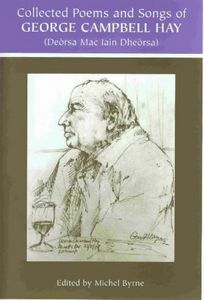George Campbell Hay (Deòrsa Mac Iain Dheòrsa) has been hailed as an important voice in Scottish literature and as a crucial figure in the renaissance of Gaelic poetry in the twentieth century. Yet with his collections long out of print, only a small proportion of his work has been available to the public. These two volumes gather together for the first time These two volumes present George Campbell Hay's complete original poems, in Gaelic, Scots, English, French, Italian, and Norwegian. Volume I presents all of the poems chronologically, with accompanying English translations. Volume II provides annotations to each poem, including a full list of sources; a detailed biography, heavily reliant on Hay's own correspondence, which sheds new light on the social, political and literary context of his work; an outline of Hay's main poetic concerns, in theme and in form; and some of Hay's own musical settings. The publication of this long-awaited scholarly edition is a landmark in Scottish and Gaelic publishing. The volumes represent a notable addition to the canon of twentieth-century Scottish literature and should permit a full evaluation of Hay's significance. Published as a two-volume set in a deluxe edition in association with the Lorimer Memorial Trust.
He was educated at Fettes College (which he despised) and the University of Oxford. He served in the British Army in North Africa during World War II, a region which featured in much of his work
Mochtar is Dughall, an epic about a Highland soldier, and a North African Arab in World War II is commonly considered to be his greatest work.
The poem Hay regarded as his major work, drawing a parallel with Sorley Maclean's An Cuilithionn, survives only in fragments. What we have of Mochtàr is Dùghall supplies a rough idea of the form the whole was to take, although the plan might well have undergone considerable alteration had the author been able to carry it through. Basically, Hay sets side by side two young soldiers who have fallen in the North African campaign of the Second World War. One is an Arab, the other a Gael, and their only meeting with one another has been in death:
Hay sees their death as extending forwards and backwards so as to involve both their ancestors and the children they might have fathered: What died in each man was not just the individual but a culture, the culture that can find no fuller expression than in living, moving beings:
He was strongly influenced by Hugh MacDiarmid, and the Scottish Renaissance.
